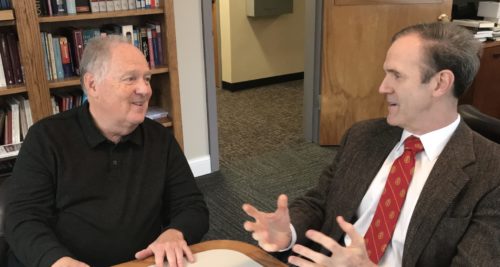An excerpt from our 2020 conversation with Samuel Gregg, during which he discusses Benedict and “the civilizational challenge of our time.”
Pope Emeritus Benedict XVI died yesterday, at the age of 95. Benedict always strongly defended and promoted simple Christian charity, carefully distinguishing it from a notion of social justice ambitiously reliant upon what politics and the state could do to further it. He saw works of charity as expressions of love. “Love—caritas—will always prove necessary, even in the most just society. There is no ordering of the State so just that it can eliminate the need for a service of love,” he writes in 2005’s Deus Caritas Est.
Benedict also taught that reason and faith are intertwined, and that we all need to better realize this. In his 2006 address at the University of Regensburg, as moral philosopher and political economist Samuel Gregg told us almost three years ago, Benedict’s “whole argument was to explain how this synthesis of reason and faith unraveled over time in the West and how various pathologies of faith and reason now act as a type of straitjacket on how we think about ourselves and the world.”
Anticipating Benedict’s funeral in St. Peter’s Square on Thursday, which Pope Francis will preside over, we republish the below excerpt from our conversation with Gregg, a distinguished fellow at the American Institute for Economic Research. It originally appeared here on March 16, 2020.

Hartmann: How off-balance are we between reason and faith?
Gregg: One of the central arguments of my book Reason, Faith, and the Struggle for Western Civilization is that if you want to understand the genius of Western civilization, it’s because it achieved a synthesis between reason and faith in a way that no other civilization has. When that gets out of kilter, we see all sorts of pathologies start to develop—pathologies of faith and pathologies of reason. The master lecture to read on this subject is Benedict XVI’s 2006 Regensburg address. In 3,800 words, he lays out the civilizational challenge of our time.
We see pathologies of faith and reason at work now. A pathology of reason would be something like what is called “scientism”—the notion that the natural sciences are the only sure way of knowing truth and anything that doesn’t fit into the empirical sciences is relative, subjective, etc. That’s a very prominent way of thinking in many Western countries today. Many intellectuals talk like that all the time. That’s a pathology of reason.
A pathology of faith would be something like the rampant sentimental humanitarianism that you find in religious organizations today. For example, when we constantly hear talk about love and caring for people—all of which is good, but Christianity and Judaism have always said that these things need to be informed by reason, because love without reason and truth becomes sentimentalism. Sentimentalism is when you treat people like puppies, like little toys.
Schmidt: This is Daniel Mahoney’s point.
Gregg: Right, exactly. He talks a great deal about that. He notes that we hear a lot of religious leaders using sentimental humanitarian language. And it usually involves a concern for reason and truth going out the door, because reason is somehow seen as “rigid” and inattentive to people’s feelings. Well, I think that it is sentimentalism which hurts people because it involves infantilizing them. The rampant sentimental humanitarianism that we see in so many religious groups today is what happens to faith when it is severed from reason.
The flip side to this is another pathology of reason, which we call jihadist fundamentalism. This expression of Islam has little time for reason. It’s all about the will. God is just pure will, and we just obey. That’s not the Jewish understanding of God. There’s not the Christian understanding of God. It’s one form of Islam which has emerged over time. I think we’re in considerable trouble, in light of the West’s inability to speak about this issue.
Schmidt: Like the reaction to Benedict.
Gregg: Yes. Benedict’s Regensburg lecture was not primarily about Islam. It was about us who live in the civilization that we call the West. His whole argument was to explain how this synthesis of reason and faith unraveled over time in the West and how various pathologies of faith and reason now act as a type of straitjacket on how we think about ourselves and the world.
It sounds abstract and detached. But it has very important implications for how Western society understands itself and whether it can resist these pathologies, which keep rearing their heads over and over and over again.
Marxism is another example of a pathology of faith. If you look at Marxism, it’s got all the structure of a pseudo-religion. It has its prophets—Marx, Engels, Lenin. They have saints—Che Guevara. They have sacred books—Das Kapital, the works of Engels, etc. They have a church-like structure called the Communist party. They have a hierarchy within that party that goes up to the General Secretary. You have a General Committee. It has orthodoxies that you can’t stray from. If you stray from these dogmas, you’re a heretic. Marxism is a classic example of a type of a pathology of faith.
It’s also a pathology of reason, though, because Marxists believe that the only type of reason that exists is that which is empirical. Scientism is part and parcel of Marxism.
Schmidt: There’s a new book out from Jonathan Israel at Princeton, distinguishing the Enlightenment from the Radical Enlightenment. If you’re positing that as something to be explored as not the truth, but an understanding of the truth, then we’re actually at the radical Jacobin stage, which also took Robespierre. That is what we’re wrestling with, I think.
Gregg: I think you made an important distinction there. By the way, Joseph Ratzinger makes these distinctions over and over again.
He doesn’t see the various Enlightenments as being monolithically bad. Catholics often fall into the trap of seeing the Enlightenment as something which was universally hostile to religion and faith. But the American Enlightenment was not an anti-religious phenomenon. Nor was the Scottish Enlightenment. In fact, most of the leading figures of the Scottish Enlightenment were ministers of the Church of Scotland. If you look at the later French Enlightenment, it was clearly anti-religious, but you also find many people of faith engaging with the new learning promoted by Enlightenment thinkers while not abandoning their faith in God, let alone doubting the reasonableness of Christianity.
That’s a subtle and nuanced understanding of history, which I think is very relevant to some of our discussions about reason and faith.
Schmidt: We’ve tried to emphasize a balance between societal sectors in some of our stuff.
Gregg: Well, there are certainly some reasons for worry about what you might call imbalance as we move forward. There are quite a few people, who are called “integralists,” who basically reject the American Founding. They’re very clear about this. They see the Enlightenment as basically a negative experience—including the American Enlightenment and the Scottish Enlightenment. They regard these movements of ideas as fundamentally problematic and irredeemable.
But I don’t think that integralism has an accurate grasp of the history of ideas. There are many good things that some Enlightenments brought to fruition. Where would we be today without the Scottish Enlightenment? I think we would be living in a much less-hospitable world. Where we be without the rapid development of the empirical sciences, which took off at least partly because of important Enlightenment thinkers like Newton, who, by the way, was a believing Christian? Where would we be without these people?
The other thing, which Joseph Ratzinger has said on a number of occasions, is that there are aspects of the Enlightenment that provided important correctives to problems in the Christian world. Would we have religious liberty as we understand it today, for example, in the United States without the Enlightenment? I’m not sure we would.


